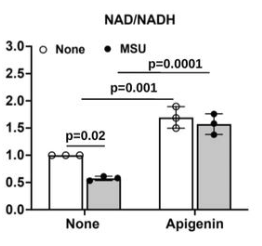This study evaluated the effects of Apigenin and Nicotinamide Riboside (NR) on factors associated with gouty arthritis.
Study Investigates Apigenin and NR on Gouty Inflammation In Vitro and In Vivo
In Vitro: Mouse-Derived Macrophages
- Researchers evaluated the effects of Apigenin in cultured macrophages derived from mouse bone marrow. Gout-like conditions were created by the addition of monosodium urate (MSU) crystals.
In Vivo: Air Pouch Gout Mouse Model
- The air pouch gout mouse model was used to investigate the effects of Apigenin and Nicotinamide Riboside (NR).
- A small pouch with a joint-like membrane lining was created under the skin of a mouse. MSU crystals, which cause inflammation and pain similar to what happens in human gout, were injected into the pouch.
- The mice were given Apigenin (20 mg/kg/day) or NR (400 mg/kg/day) daily, 3 days before the MSU crystal injection.
Apigenin Reversed Gouty-induced Changes In Vitro
The researchers treated cells with MSU crystals to simulate a gout-like cellular environment
Apigenin effectively protected cells against gout-associated changes:
- Prevented an increase in CD38, an enzyme that degrades NAD+
- Preserved NAD+/NADH levels
- Suppressed the inflammatory response

Left side of figure: Treatment with MSU crystals significantly reduced NAD/NADH levels in cells (left side, gray bar) compared to healthy cells (left side, white bar).
Right side of figure: Apigenin preserved NAD/NADH levels after MSU exposure (right side, gray bar), and were similar to levels observed in healthy cells treated with Apigenin (right side, white bar).
Apigenin and Nicotinamide Riboside Suppressed Gout-Associated Inflammation in Mice
Both Apigenin and Nicotinamide Riboside (NR) blunted inflammatory response in vivo.
- Infiltration of immune cells was reduced by Apigenin or NR
- Release of gouty-induced inflammatory molecules was lower in mice treated with Apigenin or NR
- Apigenin reduced swelling associated with the MSU crystals
- NR reduced the expression of the NAD-degrading enzyme, CD38
The effect of Apignenin on the release of the inflammatory molecule, IL-β, is depicted in the figure below.

Left side of figure: IL-1β release was much higher in mice with gout (left side, gray bar/black dots) compared to healthy mice (left side, white bar/white dots).
Right side of figure: Mice with gout treated with Apigenin released significantly lower levels of IL-β (right side, gray bar/black dots) compared to untreated mice with gout (left side, gray bar/black dots) and were similar to healthy mice treated with Apigenin (right side, white bar/white dots).
Conclusion
This study showed that Apigenin and Nicotinamide Riboside (NR) were effective in lowering inflammation associated with gout in mice.
“In the murine subcutaneous air pouch model of gouty synovitis, pouch leukocyte infiltration was markedly decreased in response to MSU crystals by apigenin treatment.”
